4 Minutes
Perplexity AI announces publisher revenue share
Perplexity AI, the San Francisco startup co-founded by Aravind Srinivas, unveiled a new initiative to share search revenue with news organizations and publishers. The company says it will start directing millions of dollars to media partners whose reporting and journalism are used to satisfy queries via Perplexity’s browser and AI assistant. The move aims to create a more sustainable monetization model for publishers in an era dominated by AI search and generative answers.
How Comet Plus works
Perplexity will administer payouts through a subscription-based program called Comet Plus, scheduled to roll out in the coming months. Subscribers who opt into Comet Plus — an add-on for existing paid users — will pay $5 per month for access. Perplexity has earmarked an initial $42.5 million pool to distribute to publishers, and the company expects the fund to grow as the platform scales. The startup frames the program as a way to ensure journalists and outlets benefit from "new business models enabled by AI."
Product features and payouts
- Subscription-based compensation tied to content usage in AI answers
- Direct attribution with links to source material so users can verify information
- An expanding funds pool to share search revenue with publishers and journalists
Comparing Perplexity with other AI search tools
Perplexity positions itself between traditional search engines and conversational AI. Unlike ChatGPT or Anthropic’s Claude, Perplexity provides up-to-date answers and typically includes source links, allowing readers to trace information back to the original reporting. Unlike classic search engines, however, it also supplies consolidated answers on its results page, which reduces the need for users to click through to source sites.

Perplexity vs Google
Google has integrated advanced AI into its search products, offering AI-generated summaries and enhanced query results. Perplexity markets a more concise, answer-first experience with explicit source attribution — and now a revenue-sharing model — as a differentiator in the crowded AI search market.
Advantages and potential benefits for publishers
Implementing a shared-revenue program could help resolve longstanding tensions between publishers and AI platforms. Lawsuits from major outlets — including the Wall Street Journal, The New York Times, and Japan’s Yomiuri Shimbun — have accused AI startups of using copyrighted material without fair compensation. Perplexity’s revenue-sharing plan aims to offer a tangible payment mechanism that both compensates publishers and strengthens the startup’s legal and public-relations position.
Use cases and real-world relevance
For readers and professionals, Perplexity’s model offers fast, verifiable answers with links to authoritative reporting — useful for journalists verifying claims, researchers doing quick background checks, and professionals who need a reliable synthesis of current events. For publishers, the program promises an additional income stream tied directly to how often their work is used to generate AI-driven answers.
Market relevance and strategic implications
This initiative highlights a broader industry shift: AI search is changing how information is consumed, and companies are experimenting with monetization strategies that balance user convenience and publisher rights. Perplexity’s Comet Plus could become a template for other AI-first search services looking to build partnerships with the news industry and defend against copyright disputes. Whether the plan persuades major publishers to withdraw litigation or prompts competitors like Google to expand their own publisher payouts remains to be seen.
By combining AI-powered search, source attribution, and a subscription-funded revenue pool, Perplexity aims to both challenge incumbent search giants and demonstrate a more collaborative path forward for publishers and AI platforms alike.
Source: m.ultrasurfing


Leave a Comment